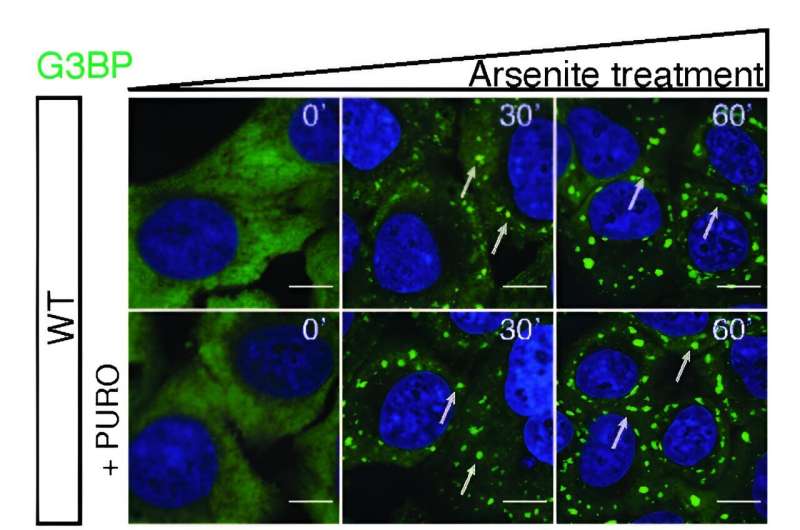This article has been reviewed according to Science X's editorial process and policies. Editors have highlighted the following attributes while ensuring the content's credibility:
fact-checked
trusted source
proofread
Discovery shows how cells defend themselves during stressful situations

A recent study by an international research team has unveiled an exciting discovery about how our cells defend themselves during stressful situations. The research, published in EMBO Reports, shows that a tiny modification in the genetic material, called ac4C, acts as a crucial defender, helping cells create protective storage units known as stress granules. These stress granules safeguard important genetic instructions when the cell is facing challenges. The new findings could help shed light on relevant molecular pathways that could be targeted in disease.
Stress granules are an integral part of the stress response that is formed from non-translating mRNAs aggregated with proteins. While much is known about stress granules, the factors that drive their mRNA localization are incompletely described. Modification of mRNA can alter the properties of the nucleobases and affect processes such as translation, splicing, and localization of individual transcripts.
The researchers show that the RNA modification N4-acetylcytidine (ac4C) on mRNA associates with transcripts enriched in stress granules and that stress granule localized transcripts with ac4C are specifically translationally regulated. They also show that ac4C on mRNA can mediate the localization of proteins to stress granules.
Their results suggest that acetylation of mRNA regulates the localization of both stress-sensitive transcripts and RNA-binding proteins to stress granules and adds to our understanding of the molecular mechanisms responsible for stress granule formation.
Stress granules are membrane-less assemblies of mRNA-protein complexes that arise from mRNAs stuck in translation initiation. RNA-protein complexes are important for their formation, and the mechanisms promoting stress granule formation involve both conventional RNA-protein interactions and interactions that encompass intrinsically disordered regions of proteins.
Stress granules have been extensively studied, and it is well-established that they form when translation initiation is limited and a variety of roles for stress granules within the cell have been proposed. While stress granule assembly and disassembly can be regulated by various post-translational modifications, the impact of RNA modifications on their formation, dispersal, and function remains largely unclear.
The RNA modification N4-acetylcytidine (ac4C) has recently been shown to be deposited on mRNA and regulate translation efficiency. ac4C is conserved through all kingdoms of life and is induced by several different stresses. ac4C is less abundant than other RNA modifications on mRNA, and due to difficulties in precise and quantitative mapping, its function and occurrence on mRNA have remained controversial.
The researchers show in their publication that ac4C is enriched in stress granules and that acetylated transcripts are predominantly localized to stress granules in response to oxidative stress, proposing a model where acetylation of RNA can affect mRNA localization to stress granules, in part by affecting the translational release of mRNA from the ribosome, providing new insight into both the function and consequences of mRNA acetylation and mechanism of RNA localization to stress granules.
The findings will promote the understanding of how the cells react to stress and which role RNA modifications play in the process. Both stress and RNA acetylation have implications in disease, and their findings could help shed light on relevant molecular pathways that could be targeted in disease.
The project was led by Ulf A.V. Ørom's lab at Aarhus University in Denmark, and the study involved collaboration with researchers from the University of Tartu, Norwegian Technical University, and the Max Planck Institute for Molecular Genetics in Berlin.
More information: Pavel Kudrin et al, N4-acetylcytidine (ac4C) promotes mRNA localization to stress granules, EMBO Reports (2024). DOI: 10.1038/s44319-024-00098-6
Provided by Aarhus University





















